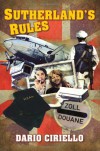Currently reading
Through the Valley of the Nest of Spiders
The Aether Age: Helios
52 Stitches, Vol. 2
Dead in the Family: A True Blood Novel
Little House by Boston Bay
Sutherland's Rules
The Accursed
The Girl Who Fell Beneath Fairyland and Led the Revels There
Geek Mom: Projects, Tips, and Adventures for Moms and Their 21st-Century Families
Witchbreaker
Any Day Now: A Novel
 So. I loved this book, but I'm not sure yet whether I can call it a "great" book or add it to my all-time favorites list; but that's not exactly damning with faint praise or a backhanded compliment. The novel is a joy to read, full of language and time and humanity and mess and poetry and music and love and cars and war and politics and more humanity on top, presented in (sometimes very) short scenes. Read this book! But there are some sections I might need to re-read, or at least think about -- let me see if I can explain at all: (NOTE: AFTER HERE LIE MINOR SPOILERS FOR TWO OF BISSON'S BOOKS, SO, BE YE WARNED.)So in alternate history, the two big joys for me are:1. being knowledgeable enough of the actual history to know where and how history diverges2. watching a very small change dovetail into larger changes, without overly stretching credulityIn Bisson's absolute classic of alternate history, Fire on the Mountain, both of these obtain. One must only accept one change -- that John Brown delayed his attack on Harper's Ferry until Harriet Tubman's illness passed, and his later attack was successful -- and, while the ensuing events range from the mundane to spaceflight, there isn't a major series of events which strains credulity.Here, I'm not entirely sure about a few things. I absolutely loved the delicious, delicious way the micro level changes are introduced, and even the combining two of them into one of the most amazing moments in the history of alternate history on stage at the 1968 Democratic National Convention. But things get a bit messy in that a half-dozen (at least) significant events pop up all over the globe, leading to a mild muddling of cause and effect. But this is absolutely a minor, minor quibble on the whole; it's an alternate history novel, so who cares if a half-dozen events all change, or just one or two? The consistency of the resulting world is what matters.And it is here where I'm just not sure yet, though the more I really sit and think about it the less unsure I am. Perhaps it is just hard for me, here in 2010+ and having grown up under the ramping-up military of Reagan, to understand why the US government is so impotent in the face of absolutely massive (yet not exactly highly militarized?) chaos within its borders in the late 1960s; how a few deserting regiments lead to such complete fragmentation. (And such a powerful UN?) Hm. Was the state of the US really on this much of a precipice in the turmoil of Vietnam?Anyway. Read this book. It's lovely.
So. I loved this book, but I'm not sure yet whether I can call it a "great" book or add it to my all-time favorites list; but that's not exactly damning with faint praise or a backhanded compliment. The novel is a joy to read, full of language and time and humanity and mess and poetry and music and love and cars and war and politics and more humanity on top, presented in (sometimes very) short scenes. Read this book! But there are some sections I might need to re-read, or at least think about -- let me see if I can explain at all: (NOTE: AFTER HERE LIE MINOR SPOILERS FOR TWO OF BISSON'S BOOKS, SO, BE YE WARNED.)So in alternate history, the two big joys for me are:1. being knowledgeable enough of the actual history to know where and how history diverges2. watching a very small change dovetail into larger changes, without overly stretching credulityIn Bisson's absolute classic of alternate history, Fire on the Mountain, both of these obtain. One must only accept one change -- that John Brown delayed his attack on Harper's Ferry until Harriet Tubman's illness passed, and his later attack was successful -- and, while the ensuing events range from the mundane to spaceflight, there isn't a major series of events which strains credulity.Here, I'm not entirely sure about a few things. I absolutely loved the delicious, delicious way the micro level changes are introduced, and even the combining two of them into one of the most amazing moments in the history of alternate history on stage at the 1968 Democratic National Convention. But things get a bit messy in that a half-dozen (at least) significant events pop up all over the globe, leading to a mild muddling of cause and effect. But this is absolutely a minor, minor quibble on the whole; it's an alternate history novel, so who cares if a half-dozen events all change, or just one or two? The consistency of the resulting world is what matters.And it is here where I'm just not sure yet, though the more I really sit and think about it the less unsure I am. Perhaps it is just hard for me, here in 2010+ and having grown up under the ramping-up military of Reagan, to understand why the US government is so impotent in the face of absolutely massive (yet not exactly highly militarized?) chaos within its borders in the late 1960s; how a few deserting regiments lead to such complete fragmentation. (And such a powerful UN?) Hm. Was the state of the US really on this much of a precipice in the turmoil of Vietnam?Anyway. Read this book. It's lovely.













